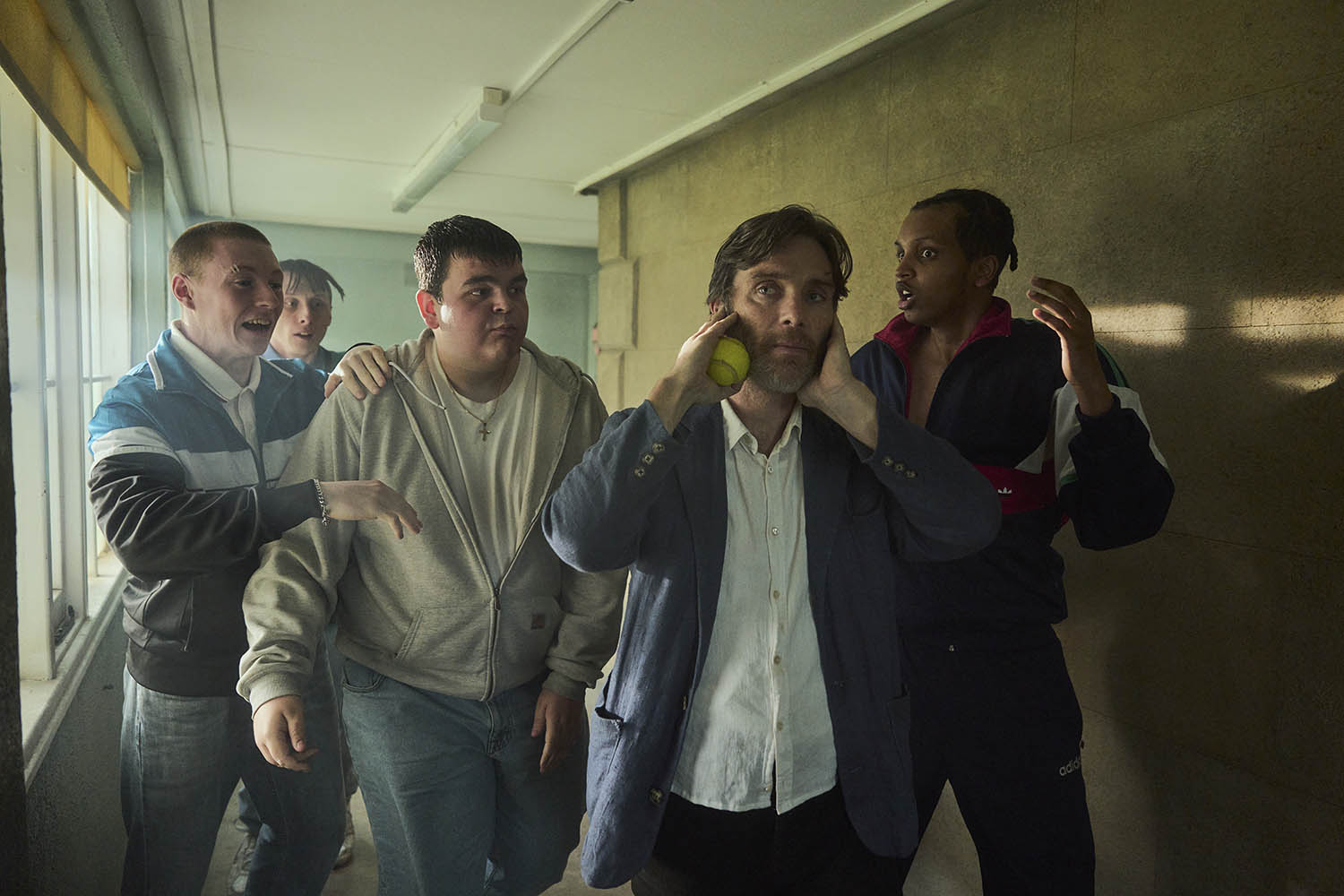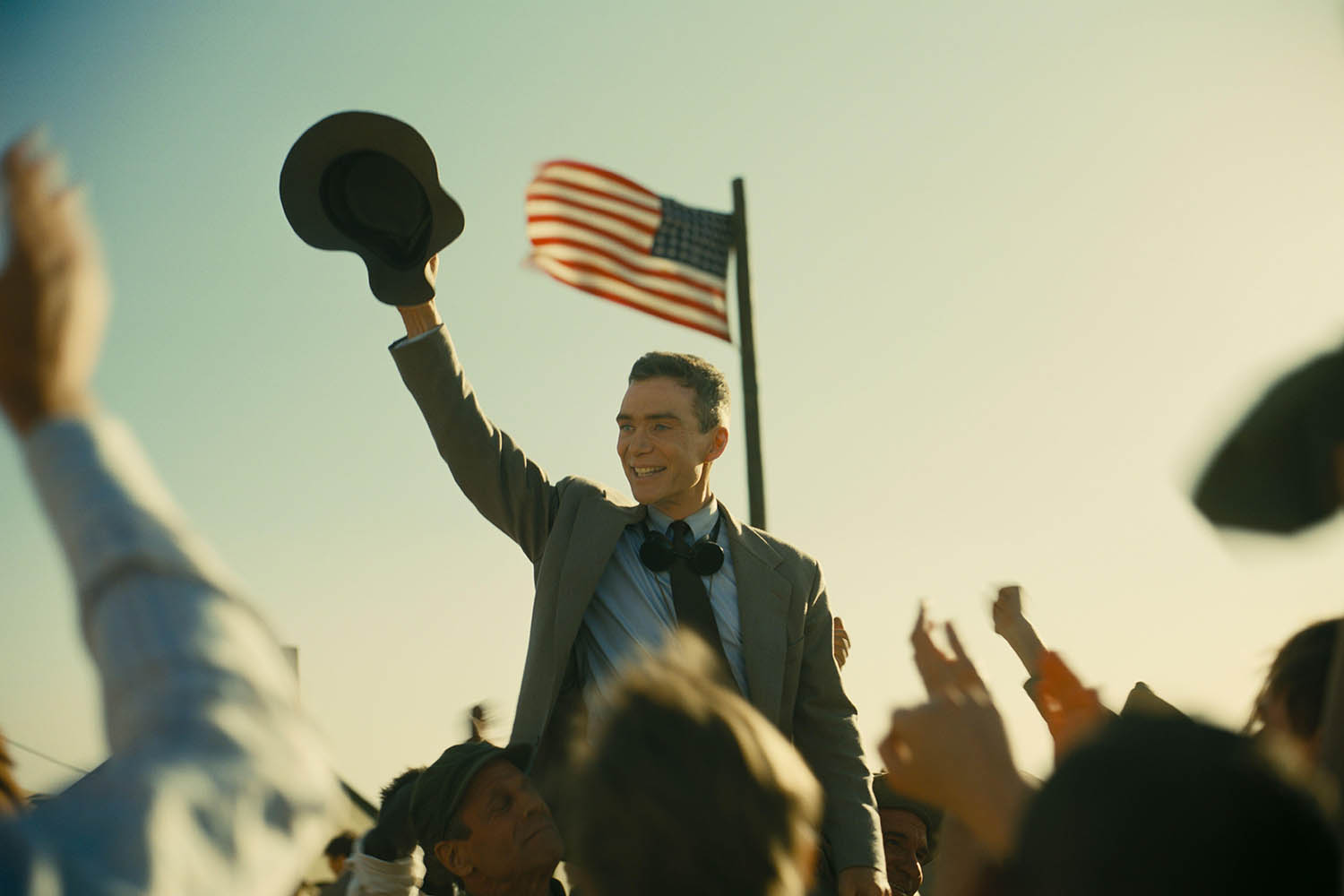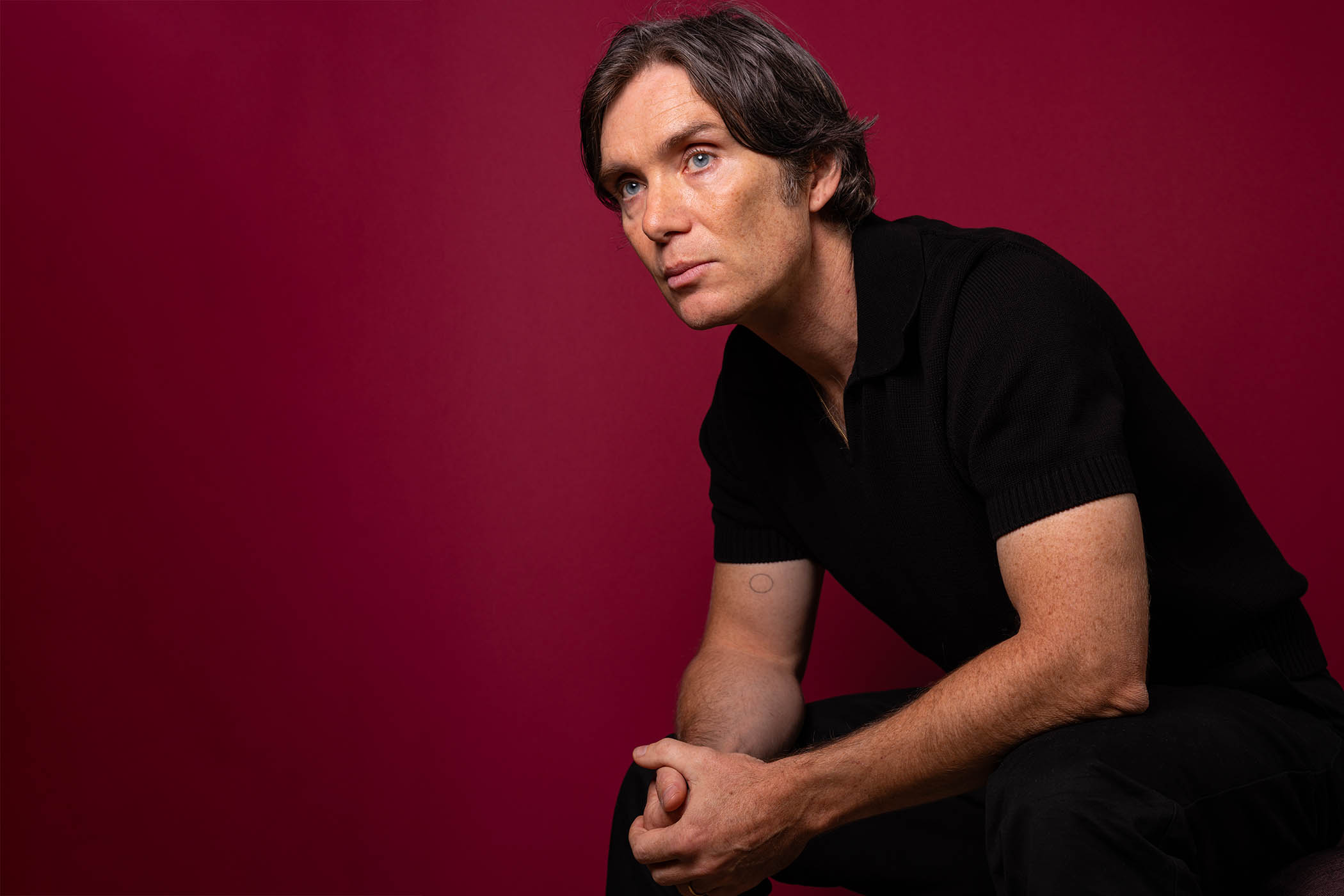Portrait by Antonio Olmos
When Cillian Murphy was preparing to play J Robert Oppenheimer in Christopher Nolan’s film about the father of the atomic bomb, he listened to a lot of classical music. This is something the actor likes to do to feel his way into character, and as Oppenheimer was a fan of Beethoven and Stravinsky, Murphy had them on repeat. “It’s not intellectual; it’s emotional,” he says. “I feel music is the only thing that can connect on that level.”
But in the spring of last year, a few months after winning an Oscar for that role, his usual process was no use. Murphy was filming Steve, an adaptation of Max Porter’s book Shy, in which he plays an exhausted, beleaguered headteacher. “I didn’t listen to any music at all during it. I didn’t have any room. It was just noise,” he says, sitting on a chair in the middle of a large hotel room in London one August morning.
Steve is set across one day at a school for troubled boys in 1990s England. The genesis of the film was Murphy and Porter, who previously worked together on a stage adaptation of Porter’s novella Grief Is the Thing With the Feathers, sitting discussing the next story they wanted to tell. Murphy told Porter that he liked the idea of focusing on a care worker or someone who is trying to do good but is crushed by the system. As it so happened, Porter had written an extensive backstory for the headteacher in his novel Shy that was never published. Whereas the book stays locked inside the head of a violent, abandoned boy, the film lets us see him through the eyes of a teacher desperately trying to save not just him, but his 15 or so classmates, their bone-tired teachers (played by Tracey Ullman, Little Simz and Emily Watson) and the entire institution crumbling around them.
Throughout his career, Murphy, 49, has excelled at playing withdrawn, troubled men. In Enda Walsh’s Disco Pigs – in which Murphy took the lead role in the play and the subsequent film adaptation – his character Pig becomes violently obsessed with his best friend, who doesn’t feel the same way about him. Later, in Ken Loach’s Palme d’Or-winning The Wind That Shakes the Barley, Murphy’s character Damien’s allegiance to the IRA comes at great personal cost. If Oppenheimer was the blockbuster version of this inner warfare, on the biggest stage of his career yet, then Steve is a stubbornly low-key chaser. It’s also a role that got under Murphy’s skin in a way that other parts had not.
“For example, Tommy Shelby, you gotta get the suit on, you do the voice, you do the cigarette, you do the walk,” he says, morphing into his Peaky Blinders character momentarily to demonstrate. “There’s a huge amount of work to become this [gangster] who I don’t share any DNA with. Whereas Max had written [Steve] for me, and we know each other so well that it’s written in my vernacular. It was very, very exposing.”
Murphy jokes that he felt in a “high state of anxiety” for most of the filming, juggling attending meetings about budgets as part of his role as a producer with scenes that required him to be extremely vulnerable, both emotionally and physically. Very unusually, everything was shot chronologically, with the tension of the story ratcheting up like a vice tightening as filming progressed.
Murphy’s tortured career is at odds with his harmonious home life; he lives by the sea in Dublin with his wife of 20 years and their two sons. I put it to him that he has previously joked about always being cast as traumatised men; so what keeps him coming back?
“I have zero interest in playing characters that are seemingly content,” he says. “First of all, I don’t think that exists. Second of all, we don’t see ourselves in those people. I think everyone is fucking struggling, to a greater or lesser degree. Everyone gets up in the morning like: how do I do this now? How do I get through this day? How the fuck do we get on in life knowing that, like, eventually, we’re all just going to die. How do we do good? How do we raise our children? All these big questions, I don’t think you find it in lighter material. It’s not for me.”

Murphy as the titular character in Steve
Murphy grew up in a suburb of Cork surrounded by educators: both his parents were teachers (“My mum was working and raising the four of us,” he points out). Nearly all his aunts and uncles, too, while his grandfather was a headmaster. “It kind of never stops, being a teacher. I just lived it as a kid with my parents,” he says. “I have huge respect for them.”
His father, Brendan, was promoted to being an inspector of primary schools, including the one Murphy attended at the time. “He was coming in and I was the one that was being thrown out of school all the time. So that was an interesting phase in our lives,” he laughs. “I was just a terrible messer, yhttps://cms.slowdownwiseup.co.uk/manage/articles/edit/2890/#ou know?”
The boys in Steve are terrible messers too, always ribbing each other and on the look out for any weakness they can find in their classmates. On the day over which the action takes place, a film crew has come to tell the story of this last-chance reform school, a stern voiceover asking whether the institution is merely a “dumping ground for society’s waste product”.
The boys play up to the camera as though it’s a dress rehearsal for the self-broadcasting bravado to come on Instagram and TikTok, but under the surface they are all in pain. These are boys who have been pushed out of their families and out of society; anger builds up inside them and then explodes.
But Murphy’s character sees them not as problems but as fragile children in need of care. It’s an approach he himself would like to see more of in society.
“Those kids you see standing on corners with hoodies on, that we identify as ‘problems’ – they’re real, brilliant human beings,” he says. “There has to be a different approach rather than just excluding them from school and shutting down youth clubs and libraries. If you are excluded or ignored, that shame is a very corrosive emotion.”
By setting the film in the 90s, Steve shows schoolchildren before the effect of mobile phones and social media, but it is also a postcard from the era that reminds us of the problems the men of today faced as boys. “Adolescence dealt with that in a way that I think is probably the best I’ve ever seen it dealt with,” Murphy says. “It’s a generationally good piece of television that will last for ever, but our film, by taking away [social media], you realise that the problems still exist.”
Murphy likes films that deal with these kinds of knotty social issues. “Given the state of the world, it would be nice to make work that is entertaining but also kind of stimulating or provocative,” he says. The first film he made with his production company, Big Things Films, was an adaptation of Claire Keegan’s novel Small Things Like These, which was released last year to glowing reviews.
Set in County Wexford in 1985, it tells the story of a coal merchant who stumbles upon one of the Magdalene laundries – houses for “fallen women”, who were kept in punishing conditions and made to perform unpaid labour as penance for their perceived promiscuity.
There is similar darkness and shame in Steve, who is traumatised after a car accident that has left him addicted to opioids and crippled with guilt. As research for the part, Murphy spoke with opioid addiction survivors to ensure they didn’t glamorise the condition, or else get it wrong.

The Irishman as J Robert Oppenheimer in Christopher Nolan’s biopic
Porter, the polymathic author, playwright and poet, adapted the original backstory into a screenplay for Netflix. He tells me subsequently that he’s drawn to stories where characters are hiding how they really feel. “I’m very interested in men who have secret pain and the way we’re all performing different versions of ourselves to the people around us,” he says.
He tells me that recently a friend of his was discussing the death of his brother and how he wished that it was possible for our emotions to be visible to others – like a colour we beam out to the world. “You’d never guess it by the way we’re required to just carry on and do our work and be fine, but we are all drenched in various different paints.”
Porter says Steve is a character who is secretly suffering, but the way that Murphy transmits his emotions, it’s like you can see the pain on him as a bright colour.
Recently, Murphy has also been returning to some of the characters from his past. Next year will see the release of the long-awaited Peaky Blinders film, The Immortal Man. He finished filming last December, but as the movie is still being worked on, he hasn’t really processed it all yet. Reprising the Shelby role felt strange, and to do so, Murphy turned to the Irish band Fontaines DC’s most recent album, Romance, describing it as a record that sounds like it was written for the film. “I did work out that I’ve been playing the character for a quarter of my life, which is kind of mad,” he says.
The spin-off comes after Murphy has repeatedly said, when asked, that he would return only if there was more story to tell, expressing his fondness for the ambiguous ending of the TV series. So what made him decide to agree to one more Shelby haircut?
“Because we got a really good script, and I have a sense of duty to the fans because, in many ways, they made the show the success that it is,” he says. “It’s a proper bookend to the whole 36 hours of television.”
Murphy has also returned to his role as bicycle courier Jim from director Danny Boyle’s 28 Days Later, more than two decades after its release. Earlier this summer, Boyle released what is the first of a planned trilogy, picking up the story decades after its predecessor in a virus ravaged Britain. When the trailer for the first film in the trilogy dropped, fans went into excited overdrive, believing they had spotted Murphy, though their hopes were eventually dashed. (A headline from last year: “Emaciated zombie in 28 Years Later is not Cillian Murphy, sources confirm.”) Despite being chronically offline, Murphy says his son made sure he saw the character who people recognised a likeness of him in. “That’s great people think I look like a zombie cadaver,” he says dryly. “It’s very flattering.”
But Murphy really is returning for the second of the trilogy, 28 Years Later: The Bone Temple, from director Nia DaCosta, which has already been filmed and will be released in January. He points out that he is “only in it for a little bit”, but his appearance at the end of the second film will set him up as a main part in the as yet unconfirmed third part. “Everyone’s got to go and see the second one,” he says of whether the final film will see the light of day. “I’m sure they will – it’s really, really good.”
Those kids with hoodies on that we identify as ‘problems’, they’re real, brilliant human beings
Those kids with hoodies on that we identify as ‘problems’, they’re real, brilliant human beings
28 Days Later was a cultural phenomenon when it was released in 2002 and has only become more so in the time since. “People still love that movie,” Murphy says. “It’s the same with Peaky, we didn’t realise it would become as beloved as it was.”
During the pandemic, when the streets were empty and paranoia hung in the air, the film was a collective reference point that helped people make sense of an upside-down moment. When I ask whether it was strange to see the image of him on an empty Westminster bridge so closely associated with that time he laughs: “Anything I do is a fucking meme.”
On the subject of memes, one I have been hoping to avoid inspiring during our conversation is “Disappointed Cillian Murphy” – a look of quiet despair he produces at being asked a question he would rather not answer. Unfortunately, I get close when I ask about life after his transformative portrayal of Oppenheimer. “We just went on a holiday,” he says. “It’s like displaced energy. If you’re doing something intensely for, like, 16 hours a day and then you stop, you come home and you’re like: what the fuck is the sofa doing there?”
But surely after months of keeping to himself in the middle of the desert, eating very little in order to stay bone-thin and obsessively thinking about the moral quandary of creating the atomic bomb, he didn’t just head to the Algarve without a second thought.
“As you’re trying to portray someone that’s in this high state of anxiety, then inevitably it will have some cost, but I think that tends to become the headline for a lot of actors, and I think it’s kind of an easy …” he trails off, an escape artist wriggling out of something that could be read the wrong way. “It doesn’t matter how you got there. Just look at the end results.”
The end result was Murphy cleaning up at prize ceremonies, winning best actor at the Academy Awards, Golden Globes, Baftas and Screen Actors Guild awards. It was clearly a gruelling, months-long schedule of publicity, and as a result, I ask whether he would campaign for another Oscar. “I didn’t expect that question,” he says. “I don’t know. I haven’t thought about it. It’s sort of a passive thing. If the film gathers momentum, then it’s a sort of a snowball effect. If the film doesn’t have any momentum, you ain’t gonna be doing it.” For some actors, a claustrophobic and personal piece of work such as Steve would be cause to embrace talking about how difficult it was, but Murphy is too painfully self-aware for that. When discussing some of the physically demanding elements of the film, he jokes that he’s getting a bit old for it now but that he loves acting with his body.
Still, there was one scene in Steve that stayed with him: a scream that his character emits while facing himself in the mirror. “None of us knew that was gonna happen the way it happened, and I don’t know if I could have done that if it wasn’t with people that I really trusted and who would never take advantage of me being that vulnerable,” he says. “Everyone was like … ‘OK [laughs], I think that we can move on.’”
I ask if, given that vulnerability, the film took any kind of toll, and he starts talking in Disappointed Cillian Murphy mode, saying: “I don’t think …” before trailing off. But then he says something that sums up his position on all of this perfectly: “Look, I’m an actor – I dress up and put on voices. It’s a very frivolous occupation in many ways, but I take it deadly seriously.”
Steve is in selected cinemas from 19 September and on Netflix from 3 October
Newsletters
Choose the newsletters you want to receive
View more
For information about how The Observer protects your data, read our Privacy Policy
Photographs by Alamy, Netflix

